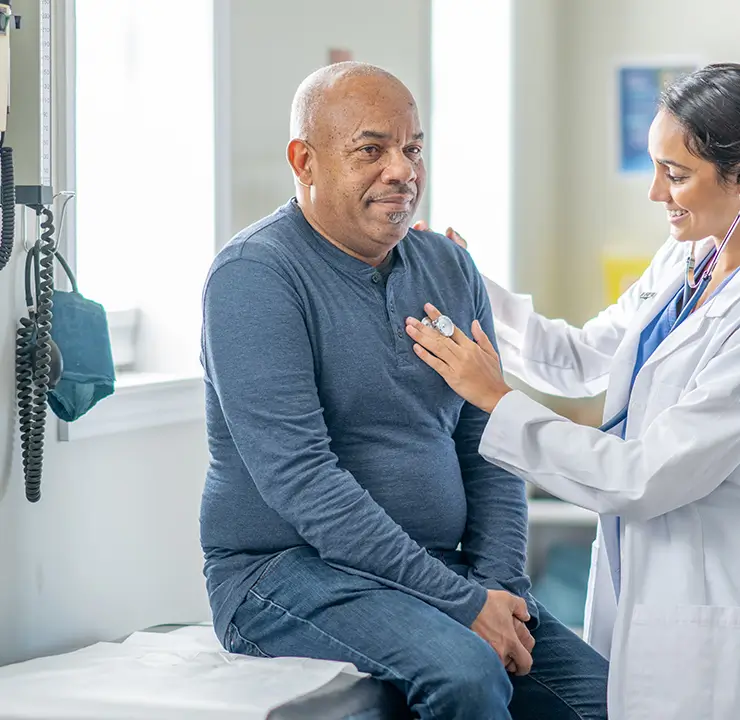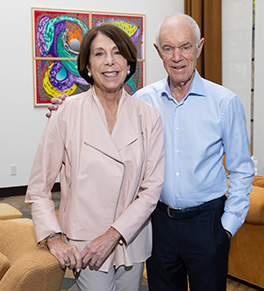
Lung Cancer Screening
Early detection saves lives. Get screened for lung cancer today and take control of your health with our innovative testing options.
Lung cancer is the leading cause of cancer-related deaths in the U.S., but when caught early—before symptoms show—it’s easier to treat.
Regular screening can help you take control of your health and catch potential problems early.

We're dedicated to diagnosing lung cancer at its earliest, most-treatable stages
Call us at 855-UCI-LUNG (855-824-5864) today to learn if you or a loved one is eligible for our lung cancer screening test.
Our approach to lung cancer screening
At the UCI Health Chao Family Comprehensive Cancer Center, we offer innovative lung cancer screening for those at high risk for developing the disease, including smokers and people exposed to asbestos and other cancer-causing substances.
Called low-dose spiral computed tomography (LDCT), this simple, painless exam takes only seconds.
Our goal at Orange County's only National Cancer Institute-designated comprehensive cancer center is to diagnose lung cancer at its earliest, most treatable stage in people at greatest risk for developing the disease.
Following screening, your results will be interpreted immediately by a radiologist, followed by a consultation with one of our highly trained lung experts who specializes in the diagnosis and treatment of lung cancer.
Benefits of LDCT screening
Early detection
Lung cancer is often found too late when symptoms appear, making treatment less effective. Traditional X-rays can only detect tumors the size of a small coin.
An LDCT scan creates detailed 3D images that can spot lung issues as small as a grain of rice. With early detection, our team of experts can offer the most advanced, personalized treatments based on your unique tumor markers.
Experience counts
The American Cancer Society recommends LDCT lung cancer screening be performed by experienced specialists at a facility that can provide appropriate care and follow-up.
Our pulmonologists, radiologists and other specialists at UCI Health — Orange County's only university health system — have access to the most innovative technology, diagnostic methods and advanced treatments to provide you with high quality, personalized care.
What to expect with lung cancer screening
When you visit UCI Health for lung cancer screening, you are seen first by our interventional pulmonology team members, who review your history and risk factors for lung cancer.
Patients who meet the study criteria undergo an LDCT chest scan, which is conducted by our experienced chest radiology team.
The scan takes only seconds, and the results are reviewed immediately by our radiology and interventional pulmonology teams.
What happens after my lung cancer screening?
Your radiologist and pulmonologist review the scan immediately after it is performed, then explain the findings to you. If you have a primary care physician, your results are sent to your physician's office immediately.
If the scan is clear, the lung specialist may discuss whether you need annual follow-up scans.
If further evaluation, testing or treatment is recommended, our lung specialists discuss these options and work with you to develop a care plan.
Our goal is to provide early and accurate diagnosis of lung cancer and to deliver carefully considered treatment to you, taking into account your individual situation and the best therapy for your particular case.
Why choose UCI Health for lung cancer screening?
Through our partnership with the Chao Family Comprehensive Cancer Center, we offer access to a variety of clinical trials, including those for early and advanced stages of lung cancer. These trials explore the latest treatment options, such as targeted therapies and immunotherapies. Many patients come to us for second opinions or to learn about these promising clinical trial opportunities.As the only university-affiliated health system in Orange County, UCI Health provides the highest level of care, backed by cutting-edge research and resources.
Lung cancer screening FAQs
Who is eligible for lung cancer screening?
Our UCI Health Lung Cancer Screening Program is recommended for:
- People between the ages of 55 and 80 who have smoked an average of one or more packs of cigarettes a day for 30 years. This includes current smokers and those who have quit within the last 15 years.
- People between the ages of 50 to 80 who currently or previously smoked an average of one pack of cigarettes a day for 20 years, and have at least one additional risk factor for lung cancer.
Additional lung cancer risk factors include:
- A previous cancer diagnosis
- Emphysema
- Pulmonary fibrosis
- A family history of lung cancer
- Exposure to radon or other substances, including asbestos, arsenic, beryllium, cadmium, chromium, diesel fumes, nickel, silica and uranium
How effective is LDCT screening at preventing lung cancer deaths?
An eight-year study by the National Cancer Institute of more than 50,000 current and former heavy smokers showed that LDCT scans reduced the relative mortality rate of lung cancer by 20 percent.
Are there any risks to LDCT screening?
The U.S. Centers for Disease Control has identified risk factors associated with LDCT screening:
False-positive results: About a quarter of LDCT patients in an NCI study of suspicious scans turned out not to have cancer.
Over diagnosis: Sometimes a suspicious mass is determined to be a small, early-stage tumor that would never grow to cause harm.
Radiation: Additional testing means more radiation exposure, which may cause cancer in otherwise healthy people. That is why LDCT lung screening is recommended only for high-risk adults who have no symptoms.
Featured Blog Posts

Lung cancer screening is essential for early detection, treatment
UCI Health is offering a new clinical trial to expand screening to relatives of certain lung cancer patients.

A 'dream come true' realized in Irvine
Dr. Michael J. Stamos once envisioned opening a small cancer center on the UC Irvine campus. What has emerged, he says, is so much more.





